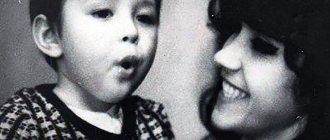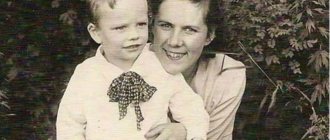Biography
Mikhail Nozhkin was born in pre-war times in the family of a front-line soldier, a worker and a nurse. The boy loved literature since childhood, began to write poetry early, and sang well. “I first came out in public at the age of five, in a hospital... I came under the first bombing in the Tula region, where my brother and parents and I were relaxing in a sanatorium. We heard that there is a war going on somewhere. But they didn't take it seriously. And so, I clearly remember, in the evening they showed a movie. The stage is open, benches dug into the ground. I’m sitting by the aisle, next to a film installation. And suddenly there was a rumble. Getting louder and louder. I thought the car had driven into the park. No, it's a plane. The Germans flew to the arms factories of Tula, saw a bright spot, a bunch of people, dropped several bombs and moved on. The only thing that saved us was that they fell behind the stage, which took the brunt of the blow. And all the same: wounded, dead, panic. The next day we collected our clothes and headed home,” recalls Nozhkin.
During the war years, while his mother and older brother were working, Misha was busy with household duties: he had to fend for bread, flour, kerosene with cards, haul firewood, clean the apartment...
His father went to the front from the very first days. He started as a soldier, then a sergeant major, and a lieutenant. But in one of the battles he was shell-shocked. It’s good that the sergeant-major tore off his lieutenant’s stripes - this saved Nozhkin Sr.’s life. He was taken prisoner to Poland and went through several prisons. In the second half of '44 - Dachau, '45 - Buchenwald. He was liberated by the Red Army at the Buchenwald branch. He arrived home on December 9, 1945. All this time his relatives did not know about his fate; they actually said goodbye to him. Mikhail admitted that at first he couldn’t believe it, he looked closely at his father. After school, the young man received a profession as a builder at the Moscow City Council technical school, and worked as a foreman at a construction site. At the same time, he actively participated in amateur performances. In 1961 he graduated from the Theater Studio of Variety Arts of the Moscow Variety Theater.
Cinema
Mikhail Nozhkin made his film debut in the sports film “Two Hours Early,” playing the coach of the “walruses.” “I came to cinema in 1967 as a very famous person, primarily as a pop playwright and poet. Therefore, I had the opportunity to choose roles. Throughout my film career, I turned down dozens of roles because they weren't interesting to me. Basically, these were negative heroes. I never wanted to play villains. This requires a different philosophy of life than mine. After all, every role is another life, small, but lived by you,” says the actor. He became widely known after starring in Veniamin Dorman’s detective films “The Resident’s Mistake” and “The Resident’s Fate.” His hero is the Soviet counterintelligence officer Pavel Sinitsyn, nicknamed “Snipe”. The song he sang in the film, “I drank birch sap in the spring forest...” also became famous.
The script of the film was based on real events, on an actual operation carried out by the KGB. According to Nozhkin, he had the opportunity to meet people who participated in this operation: “My hero Pavel Sinitsin, Bekas is a bright representative of his generation, one of those who consciously and unselfishly came to serve society and fulfilled their duty faithfully.”
"Every evening at eleven"
Mikhail played a research assistant, Stanislav Nikolaevich Nikolaev, in the melodrama “Every Evening at Eleven” directed by Samson Samsonov. The film is based on the story by writer Anar Rzayev “Me, You, Him and the Telephone.”
Plot: Stas could not even imagine that one short telephone conversation could change his life. One day, bored at home, Stas dialed a number at random and heard... her on the phone. A gentle, polite and slightly tired female voice awakened previously unknown feelings in the man’s soul. And Stas realized that he had found the one he had dreamed of all his life. A telephone romance began between a man and a woman... The film gained enormous popularity among viewers: “I really love this picture. The film was a success, the reviews were so-so, average, a B. And the crowd of spectators is fantastic. Sacks of letters. It was watched five or six times. We touched on a very important topic: how to find your other half, start a family, approach the girl you like. It was the human story that touched people. Purity of relationships. And here is the result - six months later, a menacing letter arrived from the Ministry of Communications to the Union of Cinematographers: “Do you understand that for six months now all our telephone lines from ten in the evening to one in the morning are clogged? Nobody can get through." People have come up to me so many times and said that thanks to you and your film, we met on the phone and we live very friendly. You are like our godfather. The pure influence of art." The main roles were played by: Margarita Volodina, Larisa Vikkel, Isolda Izvitskaya, Zoya Stepanova, Mikhail Bovin, Alexey Golovin, Leonid Kanevsky. After that, the artist starred in the following films: “By the Lake”, “Hope”, “Earth, Poste Restante”.
"Walking through torment"
In 1974, Vasily Ordynsky’s film “Walking Through Torment” was released, in which he tried on the image of Vadim Petrovich Roshchin. The multi-part historical drama is based on the trilogy of the same name by the classic of Russian literature Alexei Nikolaevich Tolstoy.
The writer created his monumental work for more than 20 years. In 1919, while in exile, he began work on the first book of the trilogy, the novel “Sisters,” and on June 22, 1941, on the first day of the Great Patriotic War, the last page of the novel “Gloomy Morning” was completed.
The action of the novel begins in 1914 in St. Petersburg and ends 20 years later in Moscow. In the center of the story are the vicissitudes of the lives of two sisters - Katya and Daria Bulavin. According to the actor, the character of Roshchin is one of his favorites: “I was initially offered to play Telegin. He is also good, but Roshchin is deeper, or something. They tell me this is yesterday's guy. No, he is today and always. Such people are needed yesterday, today and will be needed tomorrow. He is one of those who cannot live meaninglessly. He must understand why he lives, for what, with whom he is, against whom, what values he defends. Which is the essence of his existence. Not just forward, for the whites, for the reds. He is looking for meaning. And today there are such people. It’s hard for them, they are looking for: where is the truth, why was I born into the world. Roshchin is a thinking, cultured, intelligent, real hero. For two years he fought on the front line. In the trenches. Not just some staff guy on duty. I’m talking about these people: you can go with them not only into intelligence, but also into power.” His partners on the set were: Svetlana Penkina, Irina Alferova, Yuri Solomin, Vyacheslav Ezepov, Mikhail Kozakov, Inna Gulaya, Alexander Lazarev, Sergey Nikonenko, Georgy Burkov, Rolan Bykov. In 1980, Nozhkin appeared in the military drama “At the Beginning of Glorious Deeds” and the historical film “The Youth of Peter,” where he played Prince Boris Alekseevich Golitsyn.
"Solo Sailing"
Director Mikheil Tumanishvili invited the artist to the action movie “Solo Voyage”. He was entrusted with a hero - Major Shatokhin. With the participation of Alexander Fatyushin, Vladimir Simonov, Arnis Licitis. Plot: A Soviet warship, having completed a months-long voyage, returns to base. Suddenly, the ship's commander receives an SOS signal and, changing course, goes to the aid of the ship in distress.
However, on the spot it turns out that no one was hurt, and all this was a provocation clearly planned by American intelligence. The sailors will have to engage in a real battle... After this film, Mikhail's character was included in the top ten best movie heroes who saved the world. They began to call him “Russian Rimbaud.”
Mikhail Nozhkin
Mikhail Nozhkin
When the Great Patriotic War began, Mikhail Nozhkin was 4 years old. My father was taken to the front, my mother, the senior operating nurse, spent days and days in the hospital. Little Misha and his older brother were supposed to be evacuated, but miraculously they remained in Moscow.
Mikhail: Then they took care of it, thought about tomorrow and collected the children, took them, well, they were running around there, not homeless. My parents either went to the front or somewhere else, died in a bombing, you never know. For work, children were collected from households and taken away somewhere far away, to Central Asia, the Urals, wherever. We thought about tomorrow, took care of the children. And my grandmother, may God rest with her, when the Germans were standing nearby near Moscow, said: “Klashka, the Germans should not be in Moscow, hide the children, in two or three months they will drive him away.” Actually, honestly. And my mother hid us, we went out in the evening to get some air, and hid us somewhere in a shed.
The sounds of his childhood are the wail of sirens. Instead of toys, there are real pistols with real cartridges. There was a lot of reality in his childhood: planes in the sky, the sounds of exploding shells.
Mikhail Nozhkin
Mikhail: I remember the bombings, there weren’t so many of them, but I remember clearly, I clearly remember the howling of sirens, there were sirens on the main highway, and at first we went to the bomb shelter at the Kursky station, there was no metro closer, and to Kursky it’s from Yauzskaya via dugout, you go up the hill and go - lights out, as soon as you go back - there's another alarm, you get there, go down to the subway for a while - lights out.
And it’s a long way to go, the boys were sleeping on the floor, they’ll throw some rag, a mattress, a blanket... And then they said: you know, we won’t walk, they’ll bomb it - and they’ll bomb it there, as will be, as God willing. And they didn’t start walking. We walked for a month, maybe we didn’t stop walking. But after the war I couldn’t stand the smell of the subway for another ten years.
This late 19th century house became the first military hospital during the war. Mikhail Nozhkin’s mother and grandfather, who was a doctor, worked here. It was in the courtyard of this hospital that the Nozhkin family spent the first years of the war.
Mikhail: I saw the war in person, because the wounded, killed, and broken were brought from the front line. I have talked about this many times and will never tire of repeating that I remember the front-line soldiers, all wrapped in these tires, clamps, all kinds of sticks, crutches, the pain, of course, is continuous. And the doctors - this is the most vivid impression: washed out gowns, red with blood, the blood was absorbed, and they did not have time to wash them, the gown was white and seemed to be red, the sleeves were red, because there was no time, there was not enough...
The bandages were re-washed, the blood was washed out red, the robes were red from the blood. And I don't remember evil people. Sick, beaten, broken, but with a smile, with a joke, they egged each other on, talking about anything.
Mikhail Nozhkin
Nozhkin also clearly remembers the hated cards on which food was issued. For a long time, the boy had the same dream: a piece of black bread, on top of which was a thin piece of white bread. It was the biggest, most inaccessible delicacy.
Mikhail: I couldn’t imagine how without cards you can come and buy what you want and how much you want. This fantasy was just an absolute, unrealistic fantasy. And so I came, but there were no cards. Either it was lost or stolen, God knows. And this was two days, five more days remained to live without cards. It was so bad that my mother didn’t scold me or hit me. For me, such psychological impact was the most terrible punishment. She didn’t do it on purpose, just hit, hit, whatever. We got out, our relatives helped, we lived together. Some are a piece, others are that, fifth to tenth. But she would have torn me out, scolded me, whatever... She just calmly said: “Well, what should I do...” I was ready to jump from the second floor, just to be punished. No, no one said anything, not the older brother, nothing. This was the biggest punishment for me.
Here, in the wards of the Yauza hospital, the first performances of the handsome Mikhail Nozhkin began: the boy climbed onto a stool and read poetry. The best reward for Mikhail was the smiles and applause of adults. In his youth, Nozhkin had all the prerequisites to become an actor. But was it really a profession back then? Strong working hands are what the post-war country lacked.
Mikhail Nozhkin
Mikhail: I had an agreement with my parents: a man needs a normal profession, because the scene will either work out or it won’t work out, that’s all that God gives an actor. Well, what if it didn’t work out? So what, I would run like an unhappy person into society: “People don’t understand great talent.” I was an amateur, a laureate of all sorts of competitions, festivals, etc., but a man needs a normal profession.
For a solid profession, Nozhkin went to the construction technical school of the Moscow City Council, where he mastered three specialties at once.
Mikhail: I started working every night, because I went to work as a foreman, a foreman, and then I worked a little as a technical equipment engineer, “Cheryomushki” built two buildings, laid the foundation a little, then... In general, I worked. I had a good profession, in practice I was a reinforcement maker, knitted belts, then did something else, worked in a woodworking shop.
We were brought up very well, in addition to theory, there was always practical work, so I have about three simple working professions: reinforcement worker, woodworker, wood miller... And they gave me the third grade or they didn’t. They gave it to me, I remember. And that’s why I had several professions, no matter how many years I could support myself.
Mikhail Nozhkin
Construction in the morning, classes in the theater studio in the evening. A whole day spent surrounded by drawings and building materials was followed by an evening of facial expressions, dancing, voices and games. An energetic young man has a varied life.
Mikhail: And then I went to the Variety Theater with Smirnov-Sokolsky, graduated from the studio and at the same time began to play the main role in the play. And partners at once: Mironova, Menaker, Alexey Georgievich Alekseev, a famous entertainer, he was also the artistic director of the operetta, he wrote scripts. He lived for a long, long time, everyone knows him, God knows how long he lived and did good things, he was a very interesting person, a legendary personality.
After the studio, I worked at the Variety Theater in the state, our theater was on Mayakovka, then Sovremennik was there after us, we were transferred to Bersenyevka - there was nothing left of the theater there, there was a room, a club of the Council of Ministers. And then I played two or three performances in addition to variety programs, the program was updated every year, various festivals, etc. I already began to write a lot, write for myself, write for everyone, I was a variety playwright.
In a short time, Mikhail Nozhkin became one of the most popular pop artists. He acted both as an author and as a performer. His songs were even performed by Vladimir Vysotsky at the beginning of his career. Mikhail: I worked all the time and a lot. Then he began to work not only as a department number, but also did a solo performance. “I’m fooling you” was the name of the program, after which I was actually kicked off the stage.
Mikhail Nozhkin
It was 1967. Nozhkin’s first solo program, “The Fool with You,” became the last on stage. But even after leaving the Variety Theater, the pressure on Nozhkin did not decrease, and in 1970, the world-famous Time magazine published an article “Musical dissidents of the Soviet Union,” where, of course, Nozhkin’s name turned out to be.
Mikhail: So, the main dissidents are: Solzhenitsyn, the second is Nozhkin, the third is Galich and the fourth is Vladimir Vysotsky. Here are the photos: Volodya Vysotsky, my photo. This is a very interesting argument.
But Nozhkin was never a dissident.
Mikhail: I always fought with these scoundrels, and not with the country and the people. I love Russia very much, I love our state, I believe in it, etc. But there were scoundrels both then and now, and they ruined everything, by and large.
Mikhail Nozhkin
Nozhkin is a man who is not afraid to speak the truth. They kicked me out of the theater, called me a dissident in an American magazine - nothing, I got over it.
Mikhail: I was not afraid to remain unemployed, because I have many professions. They performed my poems, songs, some sketches, I wrote all forms, everything related to words on the stage, I was a very popular pop playwright. And I’ve already started writing large forms. I moved to the professional committee of Moscow playwrights, that is, I was de facto not listed as unemployed, because if you don’t work for two months, they could take you by the scruff of the neck and send you anywhere. Did not work out.
It didn’t work out, because there were wiser directors, for whom talent in a person was more important than any ideological prejudices.
Mikhail: Several theaters invited me, I went, in some year 1950, at the 1959 graduation, Zavadsky was sitting at the Mossovet Theater, Revzina was sitting, Olenin... They were sitting on Zhuravlev Square, the Mossovet Theater was there temporarily. And so I went through the artistic council there, and they accepted me, and I didn’t go.
After Nozhkin was invited to audition for the Leningrad Comedy Theater. One fine day, he secretly left Moscow, leaving his business to go to the artistic council.
Mikhail Nozhkin
Mikhail: Funny story, it will be interesting for TV viewers. You’re young, you’re still worried, even though I’ve already played the main role, but still. And I came, such a corridor, as I remember now, on the second floor, a door, and a man was sitting, his hands this way and that, now he sat this way, now he was worried. I looked, I think it’s a familiar person, is it him or isn’t he? And a piece of paper on the door says “Meeting of the Arts Council.
Two questions, the first question: screening the artist Nozhkin for admission to the theater. The second is about the disgraceful behavior of the artist Sergei Filippov.” Filippov was sitting, our famous comedian, and once again he was just playing Osip in “The Government Inspector,” and he was delayed somewhere during the filming, it so happened, and once again he was kicked out.
And he says to me: “What do you think, they’ll accept you, I know you’re done, don’t worry.” And I reassure him: “Well, where are we without you, you are the name, the box office, the tickets.” In general, we sat and calmed each other down. They accepted me, he was reprimanded, the 597th warning, of course, was left. This is very memorable.
But Nozhkin did not stay in this theater either; then a very lucrative invitation came to the Moscow operetta, where an artist like Nozhkin, singing and dancing, was needed. But the artist remained faithful to pop art here too. Since 1966, Mikhail Nozhkin has been acting in films. The first work is “New Year's television musical”.
Mikhail Nozhkin in the film “Walking Through Torment”
Mikhail: The plot is that the New Year comes two hours earlier and takes everyone by surprise, before they have time to prepare. There were pop numbers, popular ones, the actor Raikin was there, etc. And I had a role that ran through this whole plot, I played a trainer (then walruses appeared, hardening with cold water...) in walrusism. I was there in swimming trunks, I was a healthy guy, I was all pretending to be doing something, and I wrote verses with the refrain “Hurray, comrades, hurray” (they will make a sixth disc or a seventh, I’ll definitely include it), very sharp, I was a very sharp person, That's why they kicked me out, I was socially acute.
I wrote the verses, and because of these verses the film was almost released, but then they somehow cut it, they threw me out, of course, they left me a little literally, but everything else that I did... And what else I did on the set, I added , that the role is a winter training coach.
And the arts council grabbed his head: “What morzhenism! Crazy!" There was mischief, of course, and, thank God, it still remains. And these verses, and behind such a funny choir dancing, with trumpets, in swimming trunks, a ice dancing coach, I danced the cancan there and sang: “In the 20th century we keep up with fashion, we argue about tastes until the morning, women wear skirts getting shorter every year, hurray, comrades, hurray.”
Mikhail Nozhkin
A year later, Nozhkin starred with Yuri Ozerov in “The Resident’s Mistake.” This film brought him television fame, Nozhkin played in two parts of the film - in “The Resident’s Mistake” and in “The Fate of the Resident.” But he refused to continue playing.
Mikhail: Because it was very poorly conceived, there was absolutely nothing for me to do, and I suggested, well, let’s redo it... An agreement, I warned them in advance, I was very friendly with Dorman, the director, and when they wanted a third, I said: let’s have a third, Venya, go ahead, but let’s do something, because the second one was already a collective one.
If the first one was one to one in life, this is very strong, the second one was already collective, something was from other situations, they came up with something. And the third one, I haven’t even read the script yet, they told me, I say: “Well, look what to do, you don’t have to smear all the good things on the plate later.” They didn’t give me the script, then they gave it to me, I read it and said: “I can’t.” Like after the fact, where should you go, well, there seems to be nowhere to go, but it turned out that an agreement is worth more than money.
And then roles in the films “Liberation” and “Walking through Torment”.
Mikhail Nozhkin
Mikhail: Ordynsky actually suggested that I play Telegin first. And I really loved cinema and love cinema, I had all this cuisine, as they say, cinema, television, even then the first “Blue Light” was running in parallel, since 1962 I have participated in television programs, etc.
Of course, I played him with pleasure, unfortunately, many shots were not included in the film, good ones, not included, for various reasons, for some stupid reasons. For example, the scene was luxurious, they filmed it for a long time in Alabino, I was galloping on horses, chopping, and the scene when I pulled out a saber, snatched a saber, and when he misfired, he wanted to shoot himself, and I said: “Are you putting on a performance in front of everyone?” ? Because he was scolded, the regiment disappeared, and he seemed to want to shoot himself, it didn’t work out, it misfired, he really misfired, and I almost killed him, cut off an ear, half, part of a horse’s ear, got wound up, I’m also groovy, on the set...
In general, it was a dashing scene, my horse was still so capricious, he was lively, he just wouldn’t get up, I was nervous, she was nervous, but it was transmitted, spinning around. Well, here's the result. Someone said: “This is not good, commanders are quarreling in plain sight, and even so big, what kind of example are they setting for the soldiers?” Which soldier? Because of such nonsense, a luxurious scene was cut.
The role of Roshchin in “Walking Through Torment” is Mikhail Ivanovich’s favorite role. The team, he recalls, was excellent. Mikhail: A working moment (for cameramen), a shot that went around everyone, an interesting moment. “Walking Through Torment” was playing, and I was running into the attack with a rifle, and he (Kolya Vasilkov, the famous cameraman) was next to the camera, until they both crashed and stumbled.
And for the film “Solo Voyage” in 1985, Nozhkin was dubbed the Russian Rambo in Playboy magazine 20 years later. Mikhail: This film went around the whole world, and even Peter Arnett, a military observer, came from CNN, we sat with him for 3 hours, and the first thing he said was: “Why did you, a promoted hero, end your existence in the first episode?
It could have been twisted...” It didn’t occur to us. So this photograph - there are many photographs - took place in Spiegel, went around the whole world: it’s a montage, Rambo with a light machine gun, and me with a grenade launcher, barrel to barrel. I had already forgotten the film, etc., suddenly the year before last, they told me: “Mikhail Ivanovich, Playboy”
Post a note:
Screenwriter
Mikhail wrote the script for the film “Golden Horns”, directed by Alexander Rowe in 1972. A fairy tale about how Baba Yaga stole two little daughters from Evdokia, Mashenka and Dasha, and turned them into deer. But the fearless Evdokia turned out to have many assistants - the Sun, the Moon, the Wind, the Golden Horns and the Russian Land itself, and the most important - the son Kiryusha... The main roles were played by Raisa Ryazanova, Volodya Belov, Ira Chigrinova, Lena Chigrinova, Georgy Millyar, Alexey Smirnov, Lev Potemkin, Alexander Khvylya, Boris Sichkin, Mikhail Pugovkin, Savely Kramarov. He also created a script for a documentary called “For Life on Earth,” for which he received the State Prize of the RSFSR. Vasiliev brothers.
Poet
Mikhail Ivanovich wrote poems, mostly set to music and becoming songs. His collection of the best musical compositions includes: “The Last Battle”, “The Last Train”, “And you love her, your girl”, “I drank birch sap in the spring forest”, “I love you, Russia”, “And again elections "and many others. These works became favorite hits in the repertoire of such artists as Lyudmila Zykina, Eduard Khil, Yuri Gulyaev, Vladimir Vysotsky, Stas Namin. Not a single generation has grown up listening to his songs, although most viewers know him better as an actor: “I still have a lot of songs that no one knows about. There is no use in being offended, it’s all due to lack of culture. Authors of poetry are regularly forgotten. What is a song? This is a thought. We need to figure out what to sing about. An idea appears, you try to develop it, lay it out, build the architecture of the future song.
At first in Soviet times they said: poems by Lebedev-Kumach, music by Dunaevsky, then they simply began to announce - a song by the composer Dunaevsky. We forgot that it takes two to make a song. Poet and composer. Now they say: Nikita Bogoslovsky’s song “Dark Night”. Who is the author of the poems? Vladimir Agatov immortalized himself with these words. And no one will remember his name. Without him there would be no song. This is an absolute disregard for the meaning. Anyone can sing, some better, some worse. Not everyone can write music, and poetry even more so. So, after all, the main poet, then the composer, and only then the performer.” The lyrics of the poet’s songs are also heard in films of Soviet cinema - “Golden Horns”, “Sibiryachka”, “The Ivanov Family”, “Finist - Yasny Falcon”, “Balamut”, “Solo Voyage”. In addition, Nozhkin released a huge number of albums in which his famous hits sounded.
Creation
When his studies were completed, Nozhkin was happily accepted into the main theater troupe. Having allowed himself to engage in creativity, he was not content with the theatrical stage alone - Mikhail also took up writing songs and pop drama. Many of the compositions he wrote were performed by the famous singer Vladimir Vysotsky. Others became popular soundtracks for Soviet films of those years.
Since 1964, Mikhail Ivanovich worked at Mosconcert, and since 1967 he stopped working in a specific troupe of a certain theater, preferring contract work to this format. This was partly due to the fact that since 1968 Nozhkin began to conquer cinema.
Mikhail Nozhkin in the film “Resident Mistake”
His debut on the big screen was the role of counterintelligence agent Pavel Sinitsyn in the dramatic detective story “Resident Error,” which was directed by Veniamin Dorman. While filming a film about intelligence, the actor experienced the effects of a lie detector. Interestingly, the device itself was not included on the screens. According to unspoken rules, films about secret agents must be watched and analyzed by intelligence officers from other countries, so they did not take risks with demonstrating scientific achievements on the screen in Soviet times.
A year later, Mikhail received the main role in a romantic melodrama called “Every Evening at Eleven.” His character, a biophysicist named Stas, once called a made-up number as a joke and unexpectedly fell in love with the voice that answered him at the other end of the line. The main female role in the film was played by Margarita Volodina. Critics greeted the melodrama coolly, but grateful viewers sent bags of letters to the leading actors.
Mikhail Nozhkin and Margarita Volodina in the film “Every Evening at Eleven”
Nozhkin also played Lieutenant Yartsev in the film trilogy “Liberation”, Vasily Tsvetkov in the film “Earth, on demand”, Vadim Roshchin in the film “Walking through the Torment” and a number of other characters. In the mid-eighties, he stopped acting, deciding to devote himself to social activities and literature.
Mikhail Nozhkin in the film “Walking Through Torment”
The last work in the artist’s filmography was the role of Major Shatokhin in the action film “Solo Voyage.” Nozhkin's character manages to prevent a catastrophe provoked by the American intelligence services. The courageous, athletic, tall hero was remembered by the public. Even American critics noted the performance of the Soviet artist. After this film, Mikhail's character was included in the top ten movie heroes who saved the world. They began to call Mikhail Nozhkin “Russian Rimbaud.”
Many of Mikhail Ivanovich’s poems are widely known, mostly set to music and becoming songs. These are the musical compositions “And again elections”, “I am in the spring forest”, “The last train”, “We honestly want to tell you”, “I love you, Russia”, “Near the city of Rzhev”, “And everything is calm in the cemetery” and others. These works became favorite songs in the repertoire of Lyudmila Zykina, Eduard Khil, Yuri Gulyaev, and the leader of the group “Flowers” Stas Namin.
“I drank birch sap in the spring forest” - poems by Mikhail Nozhkin
Some of these compositions became soundtracks for the same films in which Nozhkin himself starred. Thus, the song “The Last Battle” was performed in the film “Liberation”. The artist has accumulated a whole discography, which includes albums with similar songs.
Writer
Nozhkin’s poems were published in the magazines “Young Guard”, “Friendship”, “Aurora”. In 2014, Mikhail Ivanovich wrote the books “Fulcrum” and “Be Human!” The two-volume book includes a collection of poems, poems, short stories, articles and much more. "About life. I didn't write it on purpose. This is a collection of poems, one poem, several short stories, journalism (several articles). There is a play in a book, a film story consisting of two parts... Then there is a script for a musical. That is, they present different genres in which I worked, and this is almost everything - from parodies to drama,” the publicist clarifies. He has the “Great Literary Prize of Russia” for many years of service to Russian literature and others.
Mikhail Nozhkin and his work
When Mikhail finally began to fully engage in creativity, he did not limit himself to the theater. He also wrote songs that became the soundtracks of films of that time. Also an indicator of Nozhkin’s viability in this field can be the fact that his compositions were performed by Vysotsky himself.
View this post on Instagram
Today, January 19, Mikhail Ivanovich Nozhkin (83 years old) celebrates his birthday. He was born in Moscow. Let us remember the films with his participation: “Resident Error”, “Every evening at eleven”, “By the lake”, “Liberation”, “Walking on torment”, “Youth of Peter”, “Solo voyage” and others. We wish him health and success. #actor #film actor #USSR #Soviet Union #Mikhailnozhkin #resident's mistake #resident's fate #every evening eleven #walking torment #petra's youth #solo swimming #actor #USSR
A post shared by Ivan Sadovnikov. From Russia. (@ivan.sadovnikov) on Jan 18, 2020 at 10:12pm PST
Since 1967, Nozhkin began working with theaters under contracts, ceasing to be a permanent part of any group. All because the man began to try his hand at cinema. The most famous films with his participation: “Resident Mistake”, “Every Night at Eleven”, “Walking Through the Torment” and others.
Personal life
In the artist’s personal life there was only one love, which he carried throughout his entire life. Her name was Larisa Golubina, she was in charge of the literary department at the Variety Theater. Mikhail met her when he was 22 years old. She is 16 years older. They lived together for 45 years. “She was an incredibly bright person. It’s very difficult for me to talk about her myself. My friends said well about her: she disciplined us all not with words, but with the mere fact of her presence. They couldn’t swear once again or say something obscene. Larisa just pulled everyone up. And me too. She was also a literary editor. Sometimes she advised something. She worked at the Ministry of Culture. Then, together with Smirnov-Sokolsky, she created the Variety Theater and served as director there. Everyone knew her as an intelligent, worthy person. We met at the theater, I came to the studio, looked into each other’s eyes once and understood everything,” recalls Nozhkin. The couple did not have children together, but the songwriter became a real father to his adopted son Dmitry Golubin. The young man also became a successful artist. Larisa passed away in 2004. “But she’s always behind me. Guardian angel. I always feel it. She’s nearby all the time,” admits the actor. Mikhail Nozhkin spoke about the details of his personal life in the program “The Fate of a Man with Boris Korchevnikov” on the Rossiya 1 TV channel.
"I love you, Russia..."
After studying at the construction technical school of the Mossovet (“a man should have a normal profession!”), after working on construction sites, Nozhkin entered the theater studio, and then the Variety Theater. He quickly became very popular with the public. But in 1967 he made a solo performance, “The Fool Is With You,” which the “upstairs” really didn’t like. Mikhail Ivanovich was practically kicked off the stage. The English magazine Time then put his photo on a par with Vysotsky, Galich, Solzhenitsyn, calling him a dissident.
- They assigned me a dissident! – the artist does not agree. “ I fought not with the state, but with the scoundrels who later destroyed the country!” I never left. This is my salvation...
And the fact that they were kicked out of the theater is even good! I work only for myself, and I still get full houses. True, I have to work hard, I plow like a horse! Sometimes journalists ask me: “You probably do fitness to be so fit and active?” I answer: my fitness is long-distance running for a piece of bread. I've been running all my life...
...I have always lived and live what Russia lives. It’s good for the country, and it’s good for me. It sucks for her, and it sucks for me. You have to believe in Russia. In fact, this means believing in ourselves, in our friends, in our past, in our future, in the fact that we can overcome laziness, betrayal, external and internal enemies. Our national idea is victory, nothing else is given.
Photo by Maxim Kotenev
Interesting Facts
- The People's Artist is one of the organizers of the Immortal Regiment of Russia movement; he joined its Central Headquarters. Also wrote a song dedicated to this movement and shot a video
- Since 1995 - member of the Writers' Union of Russia, and since 2015 - honorary member of the DPR Writers' Union
- The actor was included in the list of Soviet dissidents published in Time magazine in 1970. “In 1970, they showed me an article secretly torn from Time magazine: “The most famous dissidents of the Soviet Union: Solzhenitsyn, Nozhkin, Galich, Okudzhava, Vysotsky.” But the gentlemen miscalculated. I have never fought with my native state. “I only bombed scoundrels and traitors,” admits Nozhkin
- Mikhail Ivanovich is an active public figure and supporter of the Communist Party of the Russian Federation. Member of the Public Council under the Investigative Committee of the Russian Federation
Notes
- Uvarova, 2004, p. 451.
- The unfortunate fate of the song “I am in the spring forest”
- I drank birch sap in the spring forest - Resident error
- People's Artist of the RSFSR Mikhail Nozhkin was accepted as an honorary member of the Writers' Union of the DPR (undefined)
.
Donetsk News Agency
(April 14, 2015). Retrieved March 17, 2020. - Composition of the Public Council under the Investigative Committee of the Russian Federation (as of July 21, 2017) (unspecified)
(doc).
Investigative Committee of the Russian Federation
. Investigative Committee of the Russian Federation (July 21, 2017). Retrieved August 27, 2020. - Order of the Russian Orthodox Church of St. Sergius of Radonezh. personal lists 1978-2005. - M., 2006. - P. 425. - 495 p. — 500 copies. — ISBN 5-98738-031-6.
- Decree of the President of the Russian Federation dated March 30, 2007 No. 430 “On awarding state awards of the Russian Federation”
- Decree of the President of the Russian Federation dated July 28, 2011 No. 1019 “On awarding state awards of the Russian Federation”
- On the day of the repose of St. Sergius of Radonezh, His Holiness Patriarch Kirill led the service of the Divine Liturgy in the Assumption Cathedral of the Trinity-Sergius Lavra / News / P ...
- Press service of the Patriarch of Moscow and All Rus'.
On the feast of the Council of New Martyrs and Confessors of the Russian Church, His Holiness Patriarch Kirill celebrated the Liturgy in the Cathedral of Christ the Savior and led the consecration of Archimandrite Sergius (Telich) as Bishop of Maardu
(unspecified)
.
Russian Orthodox Church
(February 5, 2017). Retrieved March 17, 2020.
Interview
Meeting Vysotsky
“He came on stage with songs much later than me. At first, strangers sang, including mine. They remained on the record. “Everything is calm at the cemetery”, “We have been appointed a new boss” and others. We saw each other often and a lot. True, they did not become close friends. Still, we had different views on many things. And then, he was more of a party person, and I never liked this bohemian party. I think this party was what ruined him; his eminent friends, who did not help him publish a single poem during his lifetime, considered them drunken nonsense. Now Yevtushenko, Voznesensky, and others remember him, emphasizing their closeness, but during his lifetime they never helped him. They simply exploited him in a black way, did not spare him, did not spare him.”
About history and language
“What is language? This is a continuation of culture, civilization, centuries-old heritage. And history is the experience of generations, the foundation. There is a postulate: if you shoot at the past with a pistol, the future will answer us with cannons. This is not just an ominous formulation... We allowed our past to be shot not with a pistol, but with rocket launchers. Especially the Soviet past. You need to understand that there is no separate Russia, the Soviet Union, or a new Russia. There is no story from scratch. There must be a connection between times. In order not to step on a rake every time, you need to know who your enemies are and who your friends are, and how to behave in a given situation. Out of thousands of years, historians have calculated that we fought 650 times. Every century there are some kind of conflicts. And most of the aggression comes from the West. Remember, the Patriotic War of 1812, the Crimean Campaign, the Great Patriotic War...
Everyone - the British, the French, the Germans - fought among themselves, but they are friendly against us. Hitler is not on his own. There were English and European banks behind him, pumping him up. The Americans, our allies, by the way, supplied him with fuel for tanks and airplanes throughout the war. They also helped us, but we paid for it in gold and platinum. The Allies were in no hurry to open a second front, they helped everyone as much as possible, waiting until the winner of the war was determined. Nothing personal, business. They are neither good nor bad - practical. There can be no claims against them. But the barrier to the falsification of history must be put up firmly. Finally, it must be said that with Hitler all of Europe came to us: Italians, Finns, Romanians, Hungarians, Spaniards and even the French. Can you imagine the level of meanness? They all fought against us: tanks and machine guns were made in Czechoslovakia, French specialists went to Germany on rotation. We don't think about it. Many people don't know. As a result, over 27 million of our citizens died, of which 8,644,000 military personnel fell at the fronts, in the rear, or went missing. And 18,500,000 civilians died, seventeen million of whom were Slavs. 75 years have passed. And not a word out loud about the genocide of our people. And we allow it. Why are we offended by them if we betrayed ourselves? The conversation with Europe, which constantly teaches us how to live, should be short. Please, answer for the genocide of our people. And let them justify themselves to history, their grandchildren, children, let them explain why none of them answered for this.”
Prizes and awards
- Order of Merit for the Fatherland, IV degree (2011)
- “Great Literary Prize of Russia” SP of Russia, award “For the Benefit of Russia” (2007)
- Order of Honor (2007)
- Laureate of the State Prize of the RSFSR named after. Vasiliev brothers (1982 - for the script of the documentary film “For Life on Earth”)
- People's Artist of the RSFSR (1980)
- Honored Cultural Worker of the People's Republic of Poland (1975)
- Honored Artist of the RSFSR (1974)
- Order of the Badge of Honor
- Laureate of the “Trumpeting Angel” award at the All-Russian music festival “Angelic Voice of Russia”
Based on materials from Wikipedia and websites: , kino-teatr.ru, portal-kultura.ru, biographe.ru, ivi.ru, cycyron.livejournal.com, proza.ru, booklot.org.











